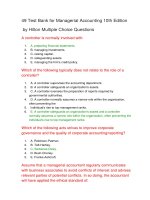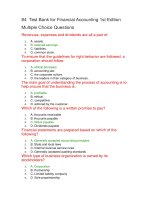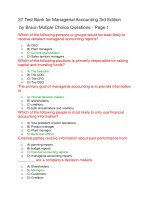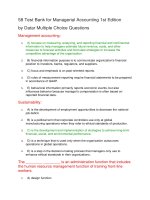Test bank for managerial accounting 1st edition
Bạn đang xem bản rút gọn của tài liệu. Xem và tải ngay bản đầy đủ của tài liệu tại đây (268.85 KB, 44 trang )
Test Bank for Managerial Accounting 1st Edition
Information for external parties about past performance is provided by:
1. A) budget reports.
2. B) financial accounting reports.
3. C) managerial accounting reports.
4. D) planning reports.
Owners of a company are its:
1. A) creditors.
2. B) customers.
3. C) managers.
4. D) shareholders.
Decision makers inside a company are its:
1. A) creditors.
2. B) customers.
3. C) managers.
4. D) shareholders.
Which of the following groups are most likely to use a company's budget
information?
1. A) Managers
2. B) Customers
3. C) Creditors
4. D) Suppliers
Which of the following groups are external users of financial information?
1. A) Customers of the company
2. B) Vendors of the company
3. C) Potential investors of the company
4. D) All of the above
Which of the following reports must be audited by an outside agency?
1. A) Annual financial statements
2. B) Monthly financial statements
3. C) Annual financial budgets
4. D) All of the above
Which of the following are the internal decision-makers of a company?
1. A) Vendors
2. B) Customers
3. C) Managers
4. D) Shareholders
Which of the following is TRUE?
1. A) Managerial accounting reports are audited by CPAs.
2. B) Managerial accounting reports provide detailed internal information.
3. C) Managerial accounting reports aid potential investors.
4. D) Managerial accounting reports must follow GAAP.
Which of the following statements is FALSE?
1. A) Financial accounting provides sufficient information for managers to
effectively plan and control operations.
2. B) Financial accounting reports help creditors make decisions.
3. C) Financial accounting helps investors make decisions.
4. D) Financial accounting provides external reports.
Which statement is TRUE?
1. A) Management uses reports created for internal parties.
2. B) Management uses financial information to plan internal operations.
3. C) Management uses financial information to analyze costs.
4. D) All of the above are true.
Which of following is TRUE?
1. A) Management accounting focuses on historical transactions.
2. B) Financial accounting uses the cash basis for recording transactions.
3. C) Financial accounting focuses on future data.
4. D) Management accounting focuses on relevant data.
The primary goal of financial accounting is to provide information for:
1. A) potential investors.
2. B) creditors.
3. C) governmental regulators.
4. D) all of the above.
The primary goal of managerial accounting is to provide information to:
1. A) shareholders.
2. B) creditors.
3. C) internal decision-makers.
4. D) both shareholders and creditors.
Which of the following types of accounting is designed to meet the needs of
decision-makers inside a company?
1. A) Audit accounting
2. B) Financial accounting
3. C) Managerial accounting
4. D) Tax accounting
Which of the following persons or groups would be LEAST likely to receive
detailed managerial accounting reports?
1. A) Plant managers
2. B) Current shareholders
3. C) Sales territory managers
4. D) CEO
Which of the following types of information are used in managerial
accounting?
1. A) Financial information
2. B) Nonfinancial information
3. C) Forecasts of future earnings
4. D) All of the above
The person MOST likely to use ONLY financial accounting information would
be the:
1. A) bank loan officer.
2. B) plant manager.
3. C) vice president of plant operations.
4. D) product manager.
Management accounting focuses on:
1. A) external reporting.
2. B) internal reporting.
3. C) tax preparation.
4. D) auditing.
Which of the following statements is TRUE about managerial accounting
information?
1. A) It is prepared annually and quarterly.
2. B) It is audited by CPAs.
3. C) It emphasizes relevance.
4. D) It must be prepared in conformity with generally accepted accounting
principles (GAAP).
Managerial information is always based on historical transactions with
external parties.
1. True
2. False
Managerial accounting reports are always prepared on a quarterly and annual
basis.
1. True
2. False
Managerial accounting information tends to report on segments of the
business.
1. True
2. False
Managerial accounting information emphasizes relevance, more than
reliability and objectivity.
1. True
2. False
The primary managerial accounting product is the company's audited
financial statements.
1. True
2. False
The primary users of managerial accounting information are internal users
such as managers.
1. True
2. False
The primary purpose of managerial accounting information is to help external
users make investing and lending decisions.
1. True
2. False
Management accounting requires independent audits of the firm's books.
1. True
2. False
The design of a management accounting system should consider how reports
affect employees' behavior.
1. True
2. False
GAAP must be followed when managerial accounting reports are
prepared.
1. True
2. False
Evaluating results against the plan is an example of the management function
of:
1. A) controlling.
2. B) decision-making.
3. C) directing.
4. D) planning.
Preparing budgets is an example of the management function of:
1. A) controlling.
2. B) decision-making.
3. C) directing.
4. D) planning.
Overseeing the day-to-day operations of a company is an example of the
management function of:
1. A) controlling.
2. B) decision-making.
3. C) directing.
4. D) planning.
Comparing actual results to budgets is an example of the management
function of:
1. A) controlling.
2. B) decision-making.
3. C) directing.
4. D) planning.
Budgets are the way that managers can express their:
1. A) plans.
2. B) decision-making.
3. C) control.
4. D) hiring practices.
Using product cost information to determine sales prices is an example
of:
1. A) controlling, planning, and decision-making.
2. B) directing, controlling, and planning.
3. C) directing, planning, and decision-making.
4. D) controlling, directing, and planning.
Reviewing hourly sales reports to determine the level of staffing needed to
service customers fulfills which of management's four primary
responsibilities?
1. A) Directing, planning, and decision-making
2. B) Directing, controlling, and planning
3. C) Controlling, planning, and decision-making
4. D) Analyzing, directing, and planning
Which one of the following manager responsibilities encompasses the other
three?
1. A) Decision-making
2. B) Feedback
3. C) Planning
4. D) Controlling
Which of the following management responsibilities is being fulfilled when
management decides to move production to another country to lower
costs?
1. A) Directing
2. B) Planning
3. C) Decision-making
4. D) All of the above
Which of the following management responsibilities are being fulfilled when
management uses feedback to take corrective action on the budgets?
1. A) Directing and planning
2. B) Planning and decision-making
3. C) Controlling and decision-making
4. D) Planning and controlling
When management compares the budget to actual results, which of the
following is being fulfilled?
1. A) Directing
2. B) Controlling
3. C) Decision-making
4. D) Planning
Planning involves which of the following activities?
1. A) Setting goals and objectives for the company
2. B) Overseeing the company's day-to-day operations
3. C) Evaluating the results of operations
4. D) None of the above
Which of the following is NOT one of the primary responsibilities of
management?
1. A) Controlling
2. B) Decision-making
3. C) Adhering to GAAP
4. D) Directing
Budgets are the quantitative expression of management's plans.
1. True
2. False
Managerial accounting develops reports that help internal parties effectively
and efficiently run the company.
1. True
2. False
Directing means setting goals and objectives for the company and
determining how to achieve them.
1. True
2. False
The four primary responsibilities of managers are planning, directing,
controlling, and decision making.
1. True
2. False
Evaluating the results of business operations against a plan and then making
adjustments to that plan is called budgeting.
1. True
2. False
Controlling means overseeing the company's day-to-day operations.
1. True
2. False
Managerial accounting gathers, summarizes, and reports the cost and
revenue data relevant to each decision that is made.
1. True
2. False
The CFO of a company is responsible for the day-to-day running of the
company.
1. True
2. False
The treasurer and the controller report directly to the CFO.
1. True
2. False
The internal audit department reports directly to the subcommittee of the
board of directors called the audit committee.
1. True
2. False
In most companies, managerial accountants no longer perform routine
mechanical accounting tasks.
1. True
2. False
Managerial accountants are now considered to be similar to advisors and
business analysts.
1. True
2. False
Oral and written communications skills are considered among the most
valuable skills a management accountant can possess.
1. True
2. False
Technology has been a driving factor in the changing roles of management
accountants.
1. True
2. False
Management accountants spend more time planning, analyzing and
interpreting accounting data and less time recording routine accounting
transactions than they have in the past.
1. True
2. False
The only skill required of managerial accountants is that they have a solid
knowledge of both financial and managerial accounting.
1. True
2. False
Managerial accountants only need a solid understanding of managerial
accounting, and not financial accounting.
1. True
2. False
Which of the following certifications is issued by the Society of Management
Accountants?
1. A) CPA
2. B) CMA
3. C) CIA
4. D) CFP
A CFO would have all of the following responsibilities EXCEPT:
1. A) preparing all corporate tax returns.
2. B) managing corporate financing.
3. C) providing reports to creditors as required.
4. D) investing in new equipment.
Who typically manages the daily operations of a company?
1. A) Stockholders
2. B) The controller
3. C) The company's board of directors
4. D) The CEO
Who typically provides oversight for large corporations?
1. A) Stockholders
2. B) The CEO
3. C) The Board of Directors
4. D) The company president
The vice-president of operations directly reports to which person(s)?
1. A) The CFO
2. B) The COO
3. C) The CEO
4. D) The Board of Directors
The COO is responsible for managing which of the following aspect(s) of the
company?
1. A) Internal controls
2. B) The annual audit
3. C) Financial, managerial, and tax accounting
4. D) Research and development, production, and distribution
Which of the following report to the audit committee of the Board of
Directors?
1. A) The treasurer and controller
2. B) The CFO and internal audit department
3. C) The internal audit department and the independent CPA firm
4. D) The CFO and the independent CPA firm
Who is primarily responsible for raising capital and investing funds?
1. A) The CEO
2. B) The CFO
3. C) The COO
4. D) The Treasurer
What has been the determining factor in the way that we now view
managerial accountants?
1. A) Stricter audit standards
2. B) Stricter GAAP standards
3. C) Technology
4. D) None of the above
Managerial accountants perform which of the following tasks?
1. A) Ensure financial records are correct
2. B) Help design information systems
3. C) Provide decision support
4. D) All of the above
Managerial accountants may be responsible for:
1. A) analyzing data.
2. B) communicating results.
3. C) providing decision support.
4. D) all of the above.
Which of the following skills are required of managerial accountants?
1. A) The ability to work on a team
2. B) Analytical skills
3. C) Oral and written communication skills
4. D) All of the above
Which would be a subgroup of the Board of Directors?
1. A) Audit committee
2. B) Financial committee
3. C) Managerial committee
4. D) Stockholders' committee
Which person or group is NOT an employee of a corporation?
1. A) The CFO
2. B) A member of the audit committee
3. C) The Treasurer
4. D) The VP of manufacturing
Which person is hired directly by the board of directors to run the
company?
1. A) The Treasurer
2. B) The CEO
3. C) The CFO
4. D) The COO
Managerial accountants often work on teams called:
1. A) audit teams.
2. B) cross-functional teams.
3. C) multi-functional teams.
4. D) workgroups.
A company's Board of Directors meets:
1. A) annually.
2. B) monthly.
3. C) periodically, as needs dictate.
4. D) quarterly.
Who requires companies listed on the New York Stock Exchange to have an
internal audit function?
1. A) The Board of Directors
2. B) The NYSE
3. C) The internal revenue service (IRS)
4. D) The stockholders
The person or position who is directly responsible for all financial concerns is
the:
1. A) CEO.
2. B) CFO.
3. C) COO.
4. D) Treasurer.
The person or position who is directly responsible for the company's
operations, such as research and development, production and distribution is
the:
1. A) CEO.
2. B) CFO.
3. C) COO.
4. D) Treasurer.
Which of the following skills are required of managerial accountants?
1. A) Solid knowledge of financial accounting
2. B) Problem solving and analytical skills
3. C) Knowledge of how a business runs
4. D) All of the above
Which of the following skills are required of managerial accountants?
1. A) Adherence to professional and ethical standards
2. B) Problem solving and analytical skills
3. C) Written and verbal communication skills
4. D) All of the above
Which of the following is NOT included in the list of necessary skills for
management accountants?
1. A) Solid knowledge of financial accounting
2. B) Problem solving and analytical skills
3. C) Knowledge of how a business runs
4. D) Ability to work independently
Which of the following is NOT included in the list of necessary skills for
management accountants?
1. A) Solid knowledge of financial accounting
2. B) Analytical skills
3. C) Designation as a qualified managerial accountant.
4. D) Knowledge of how a business runs
Which of the following is NOT included in the list of necessary skills for
management accountants?
1. A) Designation as a qualified managerial accountant
2. B) Analytical skills
3. C) Adherence to professional and ethical standards
4. D) Knowledge of how a business runs
Why is it important that all managerial accountants adhere to professional
and ethical standards as codified by the profession?A$#1
The SMA is the professional association for managerial accountants.
1. True
2. False
The CMA designation is issued by the Society of Management Accountants of
Canada.
1. True
2. False
Your company sends you to a conference to update your skills. You decide to
skip the afternoon session and go sightseeing. This violates the professional
competency and integrity standards.
1. True
2. False
The Society of management Accountants Code of Professional Ethics always
gives clear guidance for every ethical situation.
1. True
2. False
Just because a behavior is legal does not always make it ethical.
1. True
2. False
The Society of Management Accountants ethical principles include:
Responsibility, Loyalty, honour and integrity.
1. True
2. False
When faced with an ethical dilemma, the Society of Management Accountants
suggests that the first thing management accountants should do is call the
Society's ethics hotline.
1. True
2. False
To resolve ethical dilemmas management accountants should FIRST:
1. A) follow their company's established policies for Reporting unethical
behavior.
2. B) discuss the unethical situation with their immediate supervisor.
3. C) consult an attorney.
4. D) call the Society of Management Accountants "Ethics Hotline" .
Which of the following is NOT one of the Society of Management Accountants
overarching ethical principles?
1. A) Honour
2. B) Fairness
3. C) Integrity
4. D) Responsibility
The overarching principles in the Society of Management Accountants Code of
Professional Ethics include all of the following EXCEPT:
1. A) fairness.
2. B) integrity.
3. C) loyalty.
4. D) responsibility.
The standards of the Society of Management Accountants Code of
Professional Ethics include which of the following?
1. A) Integrity
2. B) Honesty
3. C) Fairness
4. D) Objectivity
Preparing financial statements in accordance with GAAP is an example of:
1. A) competence.
2. B) integrity.
3. C) objectivity.
4. D) credibility.
Communicating information fairly and objectively represents what ethical
standard?
1. A) Competence
2. B) Confidentiality









